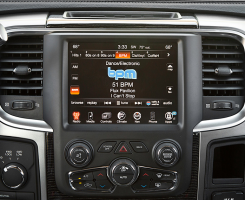
— A Jeep hacking lawsuit has been dismissed after owners complained they were harmed by Harman Uconnect 8.4A and Uconnect 8.4AN infotainment systems.
The hacking lawsuit was filed in 2015 after security researchers hacked into a Jeep Cherokee through the Uconnect infotainment system.
Due to intense media interest in the hacking job, Fiat Chrysler recalled about 1.4 million vehicles to update the Harman infotainment systems. But this didn't stop lawyers from pouncing on Chrysler, saying the recall didn't do anything to protect the systems from being hacked.
According to the lawsuit, the Jeep hack took place in a controlled environment as friendly hackers who previously had physical access to the Jeep took control of multiple functions of the vehicle. The class action was filed at a time when no other Chrysler vehicle had been hacked remotely, and to date no consumer has ever been injured.
Even though the National Highway Traffic Safety Administration (NHTSA) found no problems with Chrysler's recall, lawyers for the plaintiffs say the infotainment systems are still vulnerable to hackers.
The plaintiffs also allege Chrysler knew about the hacking dangers but concealed that knowledge, a problem that made the vehicles allegedly lose their values.
The automaker filed a motion to dismiss the Jeep hacking lawsuit in February 2016 arguing the plaintiffs lacked standing to pursue their claims. Chrysler said the class action was nonsense because none of the owners suffered any problems with their vehicles.
No vehicle other than the original Jeep Cherokee has been hacked and none of the plaintiffs owned that vehicle. In addition, the automaker argued the plaintiffs couldn't sue based on hypothetical "injuries" that could possibly occur in the future.
However, the original judge hearing the case refused to dismiss the lawsuit.
This sent Chrysler to move for reconsideration based on a decision from the Ninth Circuit Court of Appeals, upholding a district court’s dismissal of a lawsuit for lack of standing. That lawsuit involved allegations nearly identical to those made by plaintiffs in the hacking lawsuit.
The judge denied reconsideration but certified the standing issue for appeal by admitting his decision conflicted with several other decisions in very similar cases.
However, the Seventh Circuit Court of Appeals denied the appeal May 2018, but didn't say why that decision was made.
In 2018 the original judge granted the motion for class certification for all vehicles that were recalled in 2015, then the case was reassigned to a different judge when the original judge retired. Chrysler filed a motion to decertify the class action and a motion to dismiss the hacking lawsuit.
The judge points out there was one Jeep hack out of more than 1.2 million Chrysler vehicles, and the one hacking job was performed by two highly trained researchers in a controlled setting.
The expert hired by lawyers for the plaintiffs say the Uconnect infotainment systems are defective because they should have been built with more safety features.
But the expert says the defect is that the Uconnect has vulnerabilities, yet he also acknowledges that “vulnerabilities happen,” so the mere fact that a product has “a vulnerability” does not in itself mean a product is defective.
According to the judge:
"Theoretically, any product can be made safer or better – there are no foolproof products. The fact that the Uconnect has vulnerabilities and could have been made safer does not make it defective when no vehicles have ever manifested the alleged defect." - Judge Staci M. Yandle
The judge also ruled courts have been faced with similar standing challenges, but those courts determined a future risk of hacking is too speculative and that "allegations of economic loss stemming from speculative risk of future harm cannot establish standing."
"This theory of future injury was too speculative to satisfy the well-established requirement that threatened injury must be 'certainly impending,' and failed to identify a risk of harm that was 'concrete and particularized as to [the plaintiffs].'”
According to the judge, the plaintiffs may claim their vehicles lost value because of the Uconnect infotainment systems, but there has been no effect on the market for the vehicles based on "documented recalls, declining Kelley Bluebook values, or a risk so immediate that they were forced to replace or discontinue using their vehicles, thus incurring out-of-pocket damages."
The Jeep hacking lawsuit plaintiffs do not allege their Uconnect systems don't work or that they have experienced any problems related to the systems. In addition, none of the plaintiffs are unwilling to drive their vehicles because of the alleged defects in the Uconnect systems.
And none of the plaintiffs claim they have sold or traded (or attempted to sell or trade) their vehicles at a loss due to the alleged defects with the Uconnect systems.
In dismissing the lawsuit, with prejudice, the judge ruled the plaintiffs do not have standing to bring their lawsuit claims.
"The allegation that Defendants wrongfully induced them to purchase their vehicles by concealing the alleged defect in the Uconnect and that their vehicles are worth substantially less than they would be without the alleged defect is conclusory and unsupported. A ‘concrete’ injury must be ‘de facto;’ that is, it must actually exist.” - Judge Yandle
The judge ruled the plaintiffs have not suffered any injury, they received what they bargained for and they were not financially harmed by their vehicle purchases.
The Chrysler hacking lawsuit includes these vehicles:
- 2013-2015 Dodge Viper
- 2013-2015 Ram 1500, 2500, 3500, 4500, 5500
- 2014-2015 Jeep Cherokee
- 2014-2015 Jeep Grand Cherokee
- 2014-2015 Dodge Durango
- 2015 Chrysler 200
- 2015 Chrysler 300
- 2015 Dodge Charger
- 2015 Dodge Challenger
The Jeep hacking lawsuit was filed in the U.S. District Court for the Southern District of Illinois: Flynn, et al. v. FCA US LLC, et al.
The plaintiffs are represented by Armstrong Teasdale LLP, the Law Office of Christopher Cueto and Lloyd M. Cueto, P.C., and the Law Office of Stephen R. Wigginton.
CarComplaints.com has owner-reported complaints about the Chrysler vehicles.




